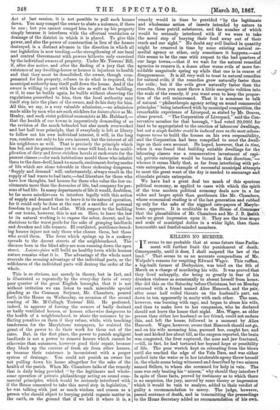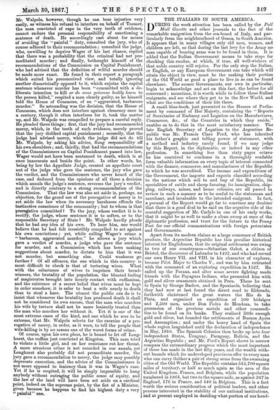KILLING NO MURDER. "I T seems to me probable that at
some future time Patlia. ment will further limit the punishment of death. Consequently, until it does, I shall suspend the law of the land." That seems to us an accurate compendium of Mr. Walpole's reasons for respiting Edward Wager. This ruffian, a big-built farmer of Derbyshire, was tried on the 8th of March on a charge of murdering his wife. It was proved that they lived unhappily, she being so greatly in fear of his drunken violence as occasionally to absent herself from home. She did this on the Saturday before Christmas, but on Monday returned with a friend named Alice Hancock, and the pair, after some half veiled threats on the husband's part, sat down to tea, apparently in amity with each other. The man, however, was burning with rage, and began to abuse his wife, and then to make love to her companion, who he declared should not leave the house that night. Mrs. Wager, an older person than either her husband or her friend, could not endure this, and left the house, followed in a moment by Alice Hancock. Wager, however, swore that Hancock should not go, and on his wife menacing him, pursued her, caught her, and beat and kicked her about till, as the surgeon reported, the brain was congested, the liver ruptured, the nose and jitiv fractured, —till, in fact, he had tortured her beyond hope or possibility of life. The poor wretch kept on retreating from the blows until she reached the edge of the Vein Dam, and was either pushed into the water or in her intolerable agony threw herself in, the whole scene being witnessed and described by two miners named Sellers, to whom she screamed for help in vain. The man was only beating his " missus," why should they interfere In spite of these facts, proved by testimony as to which there is no suspicion, the jury, moved by some theory or impression which it would be vain to analyze, added to their verdict of guilty a recommendation to mercy. The judge, however, passed sentence of death, and in transmitting the proceedings to the Home Secretary added no recommendation of his own.
Mr. Walpole, however, though he can bear injustice very easily, as witness his refusal to interfere on behalf of Toomer, the man convicted of rape in the very teeth of evidence, cannot endure the personal responsibility of sanctioning a sentence of death. He accordingly cast about for means of avoiding the "painful " duty, consulted the jury, who of course adhered to their recommendation; • consulted the judge, -who, unwilling to deprive Wager of his last chance, replied that there was a probability that the criminal had not pre- meditated murder; and finally, bethought himself of the recommendations of the Commission on Capital Punishment, who had advised that the definition of wilful murder should be made more exact. He found in their report a paragraph which suited his preconceived view, and totally ignoring another diametrically opposed to it, which enjoins the capital sentence whenever murder has been "committed with a de- liberate intention to kill or do some grievous bodily harm to the person killed," respited a man clearly guilty, as he himself told the House of Commons, of an "aggravated, barbarous murder." So astounding was the decision, that the House of Commons, which does not interfere against clemency once in a century, though it often interferes for it, took the matter up, and Mr. Walpole was compelled to prepare a careful reply. He pleaded three things ; first, that the jury had recommended mercy, which, in the teeth of such evidence, merely proved that the jury disliked capital punishment ; secondly, that the judge had advised mercy, which the judge did not do till Mr. Walpole, by asking his advice, flung responsibility off his own shoulders ; and, thirdly, that had the recommendations of the Commissioners on Capital Punishment passed into law, Wager would not have been sentenced to death, which is at once inaccurate and beside the point. In other words, he, being by law the Appellate Judge, created an appellate court out of the judge who gave the sentence, the jury who gave the verdict, and the Commissioaers who never heard of the case, and deduced from the opinions of all three a decision which annuls the judge's sentence, reverses the jury's verdict, and is directly contrary to a strong recommendation of the Commission. That the law was also set aside is, perhaps, no objection, for the grand use of the prerogative of mercy is to set aside the law when its necessary harshness offends the instinctive conscience of the community ; but to whom is that prereeative committed ? To the jury, whose verdict it is to rectify; the judge, whose sentence it is to soften, or to the responsible Secretary of State ? Mr. Walpole hardly pleads that he had any idea of his own. To hear him, one would believe that he had felt irresistibly compelled to act against his own convictions ; yet, while calling Wager's crime a "barbarous, aggravated murder," he allows a jury which gave a verdict of murder, a judge who gave the sentence for murder, and a Commission which has been making suggestions about murder, to dictate to him that it was not murder, but something else. Could weakness go further? Of all offences, the one which in this country is most difficult to check is that of torturing wives. What with the reluctance of wives to imprison their bread- winners, the brutality of the population, the blunted feeling of magistrates brought into hourly contact with ruffianism, and the existence of a secret belief that wives must be kept in order somehow, it is safer to beat a wife nearly to death than to steal a hare. The utmost the public can do is to insist that whenever the brutality has produced death it shall not be considered its own excuse, that the man who murders his wife by torture shall not be more leniently treated than the man who murders her without it. Yet it is one of the most extreme cases of the kind, and one which he sees to be extreme, that Mr. Walpole selects for the exercise of a pre- rogative of mercy, in order, as it were, to tell the people that wife-killing is by no means one of the worst forms of crime.
Of course, upon his own pleas, he is bound to let off Long- hurst, the ruffian just convicted at Kingston. This man tried to violate a little girl, and on her resistance cut her throat.
A more atrocious crime is not recorded in our annals, yet Longhurst also probably did not premeditate murder, the
jury gave a recommendation to mercy, the judge may possibly deprecate execution, and the advice of the Commissioners is not more opposed to leniency than it was in Wager's case. Yet if he is respited, it will be simply impossible to hang anybody without outraging the public sense of equity, and the law of the land will have been set aside on a cardinal point, indeed on the supreme point, by the fiat of a Minister, given because he happens to find lak highest duty a very " painful" one.



































 Previous page
Previous page